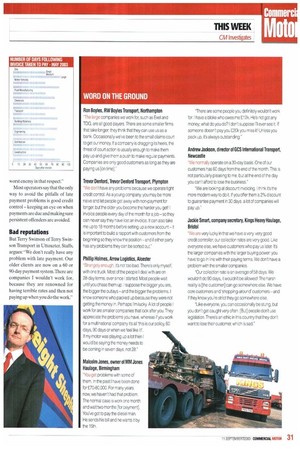WORD ON THE GROUND
Page 31

If you've noticed an error in this article please click here to report it so we can fix it.
Ron Boyles, RW Boyles Transport, Northampton The large companies we work for, such as Exel and TOG, are all good payers. There are some smaller firms that take longer; they think that they can use us as a bank. Occasionally we've been to the small claims court to get our money. If a company is dragging its heels, the threat of court action is usually enough to make them pay up and give them a push to make regular payments. Companies are only good customers as long as they are paying us [on time]."
Trevor Denford, Trevor Denford Transport, Plympton We don t have any prob.ems because we operate tight credit control. As a young company, you may be more naive and let people get away with non-payment for longer, but the older you become the harder you get! I invoice people every day of the month for a job -so they can never say they have lost an invoice. It can also take me up to 18 months before setting up a new accountit is important to build a rapport with customers from the beginning so they know the position and if either party has any problems they can be sorted out."
Phillip Holmes, Arrow Logistics, Alcester "Strangely enough, it's not too bad. There's only myself, with one truck. Most of the people I deal with are on 28-day terms, ever since I started. Most people wait until you chase them up. I suppose the bigger you are, the bigger the outlays-and the bigger the problems. I know someone who packed up because they were not getting the money in. Perhaps I'm lucky A lot of people I work for are smaller companies that look after you. They appreciate the problems you have, whereas if you work for a multinational company it's all This is our policy, 60 days, 90 days or when we feel like it!'. If my motor was playing up a lot then I would be saying the money needs to be coming in seven days, not 28."
Malcolm Jones, owner of MM Jones Haulage, Birmingham
ou ge: problems with some of them. In the past I have been done for E70-80,000. For many years now, we haven't had that problem. The normal case is work one month and wait two months [for payment]. You've got to pay the diesel man. He sends his bill and he wants it by the 15th.
"There are some people you definitely wouldn't work for: I have a bloke who owes me 2k. He not got any money; Mat do you do? I don't suppose I'll ever see it. If someone doesn't pay you Z20k you miss it! Unless you pack up, it's always outstanding," Andrew Jackson, director of GCS International Transport, Newcasile
"We normally operate on a 30-day basis. One of our customers has 60 days from the end of the month. This is not particularly pleasing to me, but at the end of the day you can't afford to lose the business."
"We are looking at discount invoicing. I think it's the more modern way to do it. If you offer them a 2% discount to guarantee payment in 30 days. a lot of companies will pay up."
Jackie Smart, company secretary, Kings Heavy Haulage, Bristol "We are very lucky in that we have a very very good credit controller; our collection rates are very good. Like everyone else, we have customers who pay us later It's the larger companies with the larger buying power: you have to go in line with their paying terms. We don't have a problem with the smaller companies.
'Our collection rate is an average of 58 days. We wouldn't do 90 days, it wouldn't be allowed! The harsh reality is [the customer] can go somewhere else. We have core customers and 'shopping-around' customersand if they know you're strict they go somewhere else.
"Like everyone, you can occasionally be stung, but you don't get caught very often. [But] people don't use legislation. There's an ethic in this country that they don't want to lose their customer, which is sad."








































































































































































































